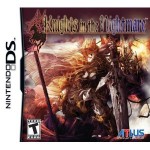The Shelf of Shame
One of the perks of not being married to a particular game genre is having the opportunity to juggle a few titles without feeling overloaded. Textbook definitions aside, different genres tend to have their own feel, push different buttons, tickle different parts of the brain. Some put greater demands on your reflexes and instincts, while others encourage you to deliberate. Some allow you to close yourself off from the outside world, while others throw you into one occupied by others. Some entrance you with aural and visual delights, allowing you to find a rhythm amidst the chaos, while others show up in plain street clothes, eventually revealing an underlying sophistication.
The tactics RPG — my umbrella term that includes what’s more commonly known as strategy RPGs, as well as RPGs that incorporate a more ‘tactical’ battle system — has always been an important part of this gamer’s diet. And while I consider X-COM one of the greatest games ever made, I have a special place in my heart for Japanese tactics games that are crafted for consoles. Unlike many of their Western-made counterparts, these games emphasize story equally with the underlying design, and no matter how juvenile the backstory, there’s almost always a charming cast of characters and character designs woven in. They’re meaty, typically offering at least 30 hours of enjoyment, yet their mission-based structure makes them more manageable to play compared to sprawling dungeon crawlers or open-ended strategy sims. When played on a handheld, they make themselves bite-sized diversions, or miniature mental workouts that can and need to be kept close by at all times. For these reasons, my tactics games and tactics RPGs have their own place on my shelf, where they can proudly sit with distinction.
It seems strange, then — discouraging, actually — that my appetite for them seems to have waned as of late. I have repeatedly popped in a new game card into my DS, thinking each time I powered it on that it was the beginning of a long and meaningful relationship, complete with walks on the beach, Sunday two-seater bike rides, colourful flower bouquets, and wrists tied to the bedposts.
For whatever reason, the same pattern slowly takes form: I trudge through the tutorial, shut things down for the night, then a week later, realize I have not returned. The calibre of embarassment derived from this inactivity lies somewhere between that which is found from looking at your stack of half-read books, and the realization that you just unintentionally ate a large bag of chips for dinner. (It’s closer to the book end of the spectrum, though.) The number of “strikes” is growing, and I cannot come up with any good explanation.
In an attempt to make amends, the last few that haven’t made the cut deserve a little praise.
Knights in the Nightmare
 There are a handful of development shops whose output will always interest me, to the point where I’m scrutinizing their latest project for any reason not to purchase it. One of these shops is Sting, particularly the team led by designer Shinichi Ito. It’s not like I know the guy or anything; I just got to know his work, first through the adorable and marvelous Riviera, then the brilliant Yggdra Union, both on GBA. Although very different from each other, each game introduced refreshing fundamental changes to turn-based battle systems, and in doing so set a precedent for subsequent titles. It’s pretty much a case now where if Shinichi Ito thought of it, Sting developed it, and Atlus localized it, on release day, I am skipping to the game store like a little girl.
There are a handful of development shops whose output will always interest me, to the point where I’m scrutinizing their latest project for any reason not to purchase it. One of these shops is Sting, particularly the team led by designer Shinichi Ito. It’s not like I know the guy or anything; I just got to know his work, first through the adorable and marvelous Riviera, then the brilliant Yggdra Union, both on GBA. Although very different from each other, each game introduced refreshing fundamental changes to turn-based battle systems, and in doing so set a precedent for subsequent titles. It’s pretty much a case now where if Shinichi Ito thought of it, Sting developed it, and Atlus localized it, on release day, I am skipping to the game store like a little girl.
Valkyrie Profile: Covenant of the Plume
 I’ve never played anything from the Valkyrie Profile series. My loss, I suppose. Because I had always associated the VP franchise to straight-up console RPGs (ditto for CotP’s developer, Tri-Ace), I didn’t give it much consideration until a couple of friends recommended it, pointing out its turn-based strategy elements. It would be nice to say there was more of a lure than that, but sometimes, it’s just nice to play something that your friends have, if only for the discussions on decisions about party members and character stat building.
I’ve never played anything from the Valkyrie Profile series. My loss, I suppose. Because I had always associated the VP franchise to straight-up console RPGs (ditto for CotP’s developer, Tri-Ace), I didn’t give it much consideration until a couple of friends recommended it, pointing out its turn-based strategy elements. It would be nice to say there was more of a lure than that, but sometimes, it’s just nice to play something that your friends have, if only for the discussions on decisions about party members and character stat building.
Infinite Space
 Once upon a time, there was a Capcom studio named Clover. Clover was formed to create original games, and brought us Viewtiful Joe, God Hand, and Okami. One dark day, Capcom closed down Clover. But then key members left to form Platinum Games. They stood as an independent, answering to their creative urges instead of big fat crybaby shareholders or number-crunching suits. They announced projects for various platforms (Wii, DS, and 360/PS3), saying each had its own strengths to offer. One of those projects was called Infinite Space. I saw screenshots. I saw spaceships. Then, I saw nothing. For there were tears in my eyes. The Japanese love their sci-fi as much as their fantasy; you just wouldn’t know it based on their videogames. This title was as unquestionably noteworthy as the company itself.
Once upon a time, there was a Capcom studio named Clover. Clover was formed to create original games, and brought us Viewtiful Joe, God Hand, and Okami. One dark day, Capcom closed down Clover. But then key members left to form Platinum Games. They stood as an independent, answering to their creative urges instead of big fat crybaby shareholders or number-crunching suits. They announced projects for various platforms (Wii, DS, and 360/PS3), saying each had its own strengths to offer. One of those projects was called Infinite Space. I saw screenshots. I saw spaceships. Then, I saw nothing. For there were tears in my eyes. The Japanese love their sci-fi as much as their fantasy; you just wouldn’t know it based on their videogames. This title was as unquestionably noteworthy as the company itself.